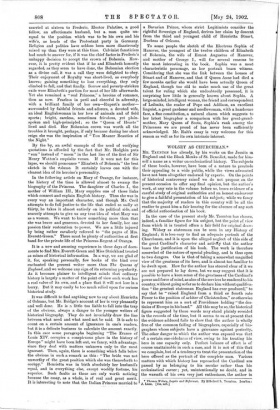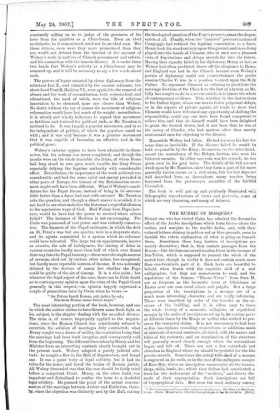WOLSEY AS CHURCHMAN.*
Mn. TAUNTON has already, by his works on the Jesuits in England and the Black Monks of St. Benedict, made for him- self a name as a writer on ecclesiastical history. The subjects of these books, however, have been of a nature to preclude their appealing to a wide public, while the views advocated have not been altogether endorsed by experts. On the points of historical controversy raised we do not propose_ on the present occasion to offer any final opinion, but the author's work, at any rate in the volume before us, bears evidence of a careful study of original authorities and an honest endeavour to give a faithful presentation of his subject; while we fancy that the majority of readers in this country will be all the readier to grant him a fair hearing for the absence of any sort of official authorisation of his book.
In the case of the present study Mr. Taunton has chosen, indeed, a familiar figure for his subject, but the point pf view from which it is treated offers a fair field for original draw- ing. WblseY as statesman can be seen in any History of England ; it is less easy to find an adequate portrait of the Churchman, and it is upon the alleged neglect of this side of the great Cardinal's character and activity that the author bases the justification of his book. The work is therefore somewhat of the nature of special pleading, and is thus open to two dangers. One is that of taking a somewhat magnified view of the greatness of its hero, and is almost too familiar to be dwelt upon. How far the author has steered clear of it we are not prepared to lay down, but we may suggest that it is possible to have a keen sense of the greatness of the Cardinal's power and force of mind, as also of the services he rendered to his country, without going gofer as to declare him without qualifica- tion "the greatest statesman England has ever produced," to say that be "raised England from a third or fourth rate Power to the position of arbiter of Christendom," or otherwise to represent him as a sort of Providence holding "the des- tinies of Europe in his hand." All this may be so, the historical figure suggested by these words may stand plainly revealed in the records of the time, but it seems to us at present that the evidence adduced fails to show that the author is wholly free of the common failing of biographers, especially of bio- graphers whose subjects have a grievance against posterity. The other danger to which a the author was exposed was that of a certain one-sidedness of view, owing to his treating his hero in one capacity only. Perfect balance of effect is of course unattainable in such a case, and it is not of this that we complain, but of a tendency to treat the presentation of the hero offered as the portrait of the complete man. Various matters with which history has reproached the Cardinal are passed by as belonging to his secular rather than his ecclesiastical career ; yet, unintentionally no doubt, and in the warmth of his own .very just enthusiasm, the author is • Thomas Wolsey, Legato and Reformer. By Et33clred L. Taunton. London Lane. [15e. net.] • constantly calling on us to judge of the greatness of his hero from his qualities as- a Churchman. Even an ideal ecclesiastic, be it remembered, need not be an ideal man. But these defects, even were they more pronounced than they
• are, would not -detract from the interest of the account of Wolsey's work in matters of Church government and reform, and his connection with the famous divorce. It is under these two heads that Wolsey's activity as a Churchman may be summed up, and it will be necessary to say a few words about each.
• The powers of legate extorted by clever diplomacy from the reluctant Leo X., and extended by the earnest reformer, but short-lived Pontiff, Hadrian VI., were applied to the removal of abuses and the work of reconstitution, both ecclesiastical and educational, the need of which, were the tide of religious innovation to be stemmed, none saw clearer than Wolsey. No doubt without the cry of abuses the movement of religious reformation would have lost much of its weight : nevertheless, it is utterly and wholly fallacious to regard that movement as fictitious and fostered for political ends, as Mr. Taunton is inclined to do. It was largely a popular movement, and in so far independent of politics, of which the populace cared no whit ; and it was only because it was a genuine movement that it was capable of becoming an effective tool in the political game.
Wolsey's reforms appear to have been admirable in them- selves, but his scheme was never completed ; and though the monks were on the whole tractable, the friars, of whom Rome had long stood in awe, gave much trouble, the Gray Friars especially defying the legatine authority with considerable effect. Nevertheless, the importance of the work achieved was considerable, and had the same spirit and energy prevailed in other parts of Europe, the history of the Reformation move- ment might well have been different. What if Wolsey's candi- dature for the Papal throne, instead of being in its outcome little better than a farce, had met with success? Mr. Taunton asks the question, and though a direct answer is avoided, it is not hard to see what underlies the historian's regretful allusion to the mysterious ways of God. Had Wolsey been Pope, how- ever, would he have had the power to succeed where others failed ? The instance of Hadrian is not encouraging. The Curia was possessed of vast power and was violently conserva- tive. The finances of the Papal exchequer, in which the debt on St. Peter's was but one spectre, were in a desperate state, and its agents committed to a system which no reformer could have tolerated. The large tax on appointments, known as annates, the sale of indulgences, the raising of doles in various countries hardly more than half of which ever found their way into the Papal treasury,—these were the staple sources of revenue, eked out by various other minor, less recognised, but hardly more reputable sources of income. It was solemnly debated by the doctors of canon law whether the Pope could be guilty of the sin of simony. It is a nice point ; but whatever the legal aspect of the case, there can be little doubt as to contemporary opinion upon the state of the Papal Court generally in this respect,—an opinion happily expressed a couple of generations later by Owen when be wrote :—
"An Petrus fuerit Romae, sub judice us est ; Simonem Romae nemo fuilse negat."
The most interesting portion of the book, however, and one in which the author claims to havethrown some fresh light on his subject, is the chapter dealing with the so-called divorce. The term is, of course, improperly applied to the negotia- tions, since the Roman Church has consistently refused to entertain the solution of marriages duly contracted; what Henry sought was a decree of nullity, the contention being that the marriage had been itself irregular, and consequently void from the beginning. The different lines taken by Henry and his Minister form an interesting contrast clearly brought out in the present work. Wolsey adopted a purely judicial atti- tude: he sought a flaw in the Bull of dispensation, and found one. It was a point truly of legal subtlety, but it had its value for the nonce, and taxed the brains of Roman jurists. All Wolsey demanded was that the case should be fairly tried before a competent Court. Henry, on the other harld, was impatient and disinclined to confine the issue to a doubtful legal subtlety. He pressed the point of the actual consum- mation of the marriage between Arthur and Katherine, there- by, since the objection was distinctly met by the Bull, raising the theological question of the Pope's power to grant the dispen- sation at all. Finally, when the "inspired" procrastinations of Campeggio had reduced the legatine commission to a farce. Henry took his stand entirely upon this ground, and in so doing played into the hands of Clement, who at once saw a pleasant vista of disputations and delays stretch far into the future. Having thus signally failed in his diplomacy, Henry at last, as Wolsey had often predicted, threw off his allegiance to Rome, and England was lost to the Church because even Wolsey's powers of diplomacy could not counterbalance the gentle suasion Charles V. was in a position to exert upon the Holy Father. To represent Clement as refusing to prostitute the marriage doctrine of the Church to the lust of a tyrant, as Mr. Lilly has sought to do in a recent article, is to ignore the whole of contemporary evidence. This, whether in the instructions to the Italian legate, whose cue was to foster perpetual delays, or in the reports of private agents, all tends to show that Clement would have welcomed any opportunity of shifting the responsibility, could any one have been found competent to relieve him, and that he himself would have been delighted to grant the desired decree, had it not been that he was at the mercy of Charles, who had motives other than merely sentimental ones for objecting to the divorce.
Meanwhile Wolsey had fallen. He had foreseen his fate for some time as inevitable. If the divorce failed he would be held responsible by the King; its success, ou the other hand, meant the ascendency of the Boleyn faction, who wei.e his bitterest enemies. In either case ruin was his reward ; he was given over in his grey hairs. The details of his fall are not dwelt upon by Mr. Taunton, since they form a part of his more generally known career as a statesman, but his last days are well described here, as throughout, many touches . being borrowed from the picturesque narrative of the faithful Cavendish.
The book is well got up and profusely illustrated witl; lithographic reproductions of views and portraits, some of which are very charming, and many of interest.







































 Previous page
Previous page